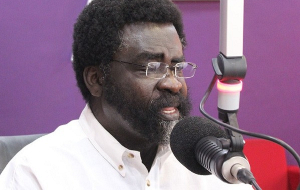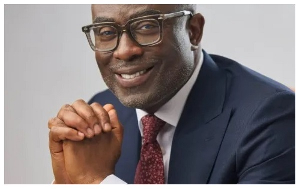Opinions of Friday, 17 June 2005
Columnist: Okoampa-Ahoofe, Kwame
The Enduring Legacy Of Dr. J. B. Danquah ? Part 14
In this segment of our discourse on the polymathic life and times of Dr. J. B. Danquah, we also highlight the fact that our subject?s tragic political fate at the hands of his former ideological minion and subsequent arch-nemesis, Dr. Kwame Nkrumah, also sharply defined the dismal human rights record of the breakaway Convention People?s Party (CPP). The CPP government?s enactment of the extortionate and infamous Preventive Detention Act, of 1958, shortly after Ghana?s re-assertion of her sovereignty from British colonial imperialism, also constituted an indelible blight on an otherwise watershed era that was supposed to have clearly defined the new republic, positively, against the relatively saturnine and sanguinary backdrop of British imperialism. Unfortunately, as later events eloquently demonstrated, the CPP government, with its Messianic and fundamentally left-wing political agenda, created little room for a salutary democratic culture. No wonder, therefore, that the CPP?s institutional niche within the epic Ghanaian imagination was destined to be evanescent and transitional, even as The Party?s single-minded and exuberant, and admittedly versatile, Prophet-in-Chief of continental African nationalism immortalized himself, thereby becoming firmly etched in the national pantheon.
Tragically, however, President Nkrumah is today much more revered and remembered for his humanitarian ideals than his ideological praxis. And a critical examination of the Sir Edward Asafu-Adjaye-led Commission of Enquiry into the Detention and Death at Nsawam Prison of Dr. J. B. Danquah (Accra-Tema: Ministry of Information, 1967), so seriously undermines the political credibility of Ghana?s pioneering premier that it is almost no wonder, retrospectively speaking, that in the wake of his February 24, 1966 overthrow by the combined forces of the country?s military, the proverbial ?African Showboy? had virtually been reduced to a veritable symbolic monstrosity of all that needed to be avoided on the continental African political landscape. For his staunch supporters, however, the CPP and its indubitably charismatic leader were a godsend.
The preceding notwithstanding, critics who firmly believe that the Marxist ideological agenda of the CPP was fundamentally undemocratic in nature and thus could not be expected to advance a liberal culture of constitutional democracy, predicate their observation on the assumption that a Marxist ideology is fundamentally and inherently totalitarian. And as David Apter aptly observes, this is exactly the agenda doggedly pursued by the Nkruma(h)ist ideologues in the wake of their Prophet-in-Chief?s pontifical declaration of ?Tactical Action,? shortly after the latter?s assumption of autonomous transitional power: ?It is clear, however, that to maximize Nkrumah?s alternatives and freedom of action, the party must serve up bases of support various [varied?] in their kind, which provide him with a variety of blocs which he can control and which, taken together, can undermine a major opposition which might emerge in the party. For example, the left-wing organization[al] group within the party is the nucleus of a more formalized non-democratic structure which could control the party, if Nkrumah so desired, and, in the event of self-government if Nkrumah?s power should wane, could dismiss parliamentary structures as British and imperialist while instituting a more totalitarian system molded after Marxian practice. This is not to say that Nkrumah would do any such thing, but it is a practical alternative which at least one member of the party high command indicated in a personal interview?(Ghana In Transition 215).
And here, it is significant to observe the prophetic nature of the preceding observation ? no pun intended ? by David Apter; for the preceding is exactly what happened in the early 1960s, when it became increasingly obvious to sizable sections of the Ghanaian populace that the exuberant and Messianic ideology of Nkruma(h)ism was at a veritable and virtual dead-end. Significantly also, we note in passing that Apter flatly declined to reveal the source of this totalitarian, tactical agenda, purportedly tucked under the sweltering sleeves of an increasingly desperate CPP top constabulary on the quite understandable, albeit curious, grounds that such revelation ?would violate certain confidences?(see Footnote in Ghana In Transition 215). In sum, implies Apter, for Nkrumah?s Convention People?s Party Ghana?s liberation struggle was paradoxically two-fold in nature, namely, to edge out British colonial imperialism, while simultaneously maintaining a perpetual ideological and political stranglehold on Ghanaians. In other words, the people of Ghana were being liberated from external colonialism, only to be internally colonized by the mercurial CPP machinery that also rapidly came to be synonymously identified, as THE PARTY, with the country itself(Ghana In Transition 215). If, indeed, David Apter is really telling his readers the truth, and we have no reason to impugn his scholastic integrity, then the 1966 coup detat which ousted the increasingly totalitarian CPP government may be aptly deemed a godsend. The definitiveness of such a conclusion, however, belongs to posterity. Our primary purpose here is to subject some of the available crucial data to a critical and dispassionate examination and suggest some of their hermeneutic implications. Even so, the largely pro-Nkruma(h)ist Apter appears to believe that the CPP-fangled ideology of ?Tactical Action,? or constructive engagement with the colonial administration, which caused the CPP to be envisaged by the opposition as a laughing stock, and which was invoked during the transitional period ? between 1951 and 1957 ? was intrinsically informed by sheer expediency than any meaningful theoretical or intellectual depth: ?Tactical Action is a unique political program because it makes possible a combination of ideological purity and pure political opportunism, the former deriving its very intensity from the latter?(Ghana In Transition 215). Indeed, one significant avenue in which then-Prime Minister Kwame Nkrumah, Leader of Government Business, expediently appropriated the pseudo-ideology of ?Tactical Action? regarded investment funding for the construction of the Akosombo Dam on the Volta river. Needless to say, it has often been erroneously presumed ? largely as a result of vehement and well-orchestrated CPP propaganda ? that Dr. Danquah was capriciously dead-set against the Volta Hydroelectricity Project. Nothing could be further from the truth. And, indeed, as Apter accurately points out, in the February 23, 1953 Gold Coast Legislative Assembly debate on the building of the Akosombo Dam, Dr. Danquah seemed to have been dead-set against the unimaginative idea of Britain and Canada being blindly solicited as the major financiers of the project ?who would control 90 percent of the shares of equity and assume [total] responsibility for the operation of an aluminum smelter?(Ghana In Transition 234-5). It is also quite interesting and significant to note that Prime Minister Kwame Nkrumah, being fervently inclined towards having the Akosombo Dam built at all costs, regardless of any dire long-term economic implications, readily subscribed himself and the rest of our emergent country to the preceding glaringly exploitative contractual proposal. And to be certain, so zealous was Nkrumah that he intimated to David Apter in a personal interview that: ?Anyone who is opposed to this scheme is crazy?(Ghana In Transition 235).
On the other hand, to Dr. Danquah the preceding economically myopic and outright suicidal stance of Prime Minister Nkrumah redoled of the patently hypocritical, in view of Nkrumah?s apparently vocal and intransigent stance against Western imperialism, at least rhetorically and propagandistically. Consequently, the more clairvoyant and experienced Doyen of Ghanaian politics made the following suggestion, according to Apter: ?Dr. Danquah charged that the scheme paved the way for control by the capitalists and imperialists. He proposed the use of Cocoa Marketing Board reserves [an institution whose establishment Danquah singularly facilitated] to finance the scheme. He asked for an ?independent? commission, not one dominated by foreigners,? to undertake financial feasibility studies on the venture (Apter 236). In sum, the entire heated parliamentary exchanges between Mr. William (Paa Willie) Ofori-Atta and Prime Minister Nkrumah (see Ghana In Transition, Second Revised Edition, 238), with the latter vehemently defending dominant British participation in the Akosombo Project, points to nothing short of hypocritical finesse. For instead of constructively acknowledging his woeful lack of optimal appreciation for the intricate economic dynamics entailed in undertaking the venture ? for, needless to say, as a Cambridge University graduate with a Master?s degree in Economics, Mr. William Ofori-Atta was arguably the finest economist in the 1953 Gold Coast Legislative Assembly ? Prime Minister Nkrumah rather chose to sophomorically and vacuously dissertate on his activist credentials as a former United Gold Coast Convention (UGCC) functionary, thus woefully begging the inescapable gravity of the issue at stake: ?As far as I am concerned[,] when the national[ist] movement started in this country, I was one of the principal soldiers against imperialism. All my acts have had this purpose. Go through the whole history of the United Gold Coast Convention[,] and you will see that my arguments have always been against imperialism. Yet you say here that Kwame Nkrumah is selling out to the imperialists?. We are not boys! Do you think I am a fool to enter into a project like that blindly? If I were a fool[,] do you think I would have been able to organize the country to this stage[?] I am not so damned silly as to put my nose into something that is detrimental to the interest of this country. Nobody says we are going to discard your criticisms?(Apter 238).
Earlier on, Mr. William Ofori-Atta had sarcastically volleyed a telling sally at Prime Minister Nkrumah, the arch-apostle of anti-imperialism: ?The British are not devils, they are English and imperialist angels (laughter)? ? (Apter 238).
Needless to say, as recent expert reviews of the contractual agreement that brought the Akosombo Dam into existence and operation have indicated, it was perhaps the lamest contract of its kind to be signed unto by Prime Minister Nkrumah. And, indeed, David Apter, an apparent ideological sympathizer of the socialist cause, does not hide his utter chagrin at Nkrumah?s glaring lack of contractual sophistication: ?In this debate, the British and the CPP were on the same side, a [quite] common situation [of the period]. At the same time, the clear-cut problem of development was never lost sight of by the Prime Minister, and no amount of talk about imperialism shook him from the object, not even appeals to his ?Marxism??(Ghana In Transition 239). In our time, we have witnessed the putative patron saint of the pseudo-civilian National Democratic Congress, Flt.-Lt. Rawlings, similarly vacillate between rhetorical and practical extremities, as when during the early days of his so-called People?s Revolution, Mr. Rawlings incessantly denounced the United States, only to momentarily mince his words by sheepishly crawling and genuflecting his way into the very purportedly malignant ideological camp of Western imperialism. Thus contrary to the widely disseminated curricular fare taught in post-colonial Ghanaian schools, Apter emphatically notes that at no time during the debate regarding the construction of the Akosombo Dam, was the Gold Coast Legislative Assembly?s oppositional faction dead-set against this historic scheme: ?The opposition sounded superficially ?radical,? warning of the ?imperialist? threat. Not opposed to the scheme itself, they were in a weak position?(Ghana In Transition 239). Apter, however, does not convincingly demonstrate just what rendered the legislative opposition relatively ?weak? in its stance regarding the best means of funding the Volta Hydroelectric Scheme. But that the tenure of the Convention People?s Party is virtually synonymous with the infamous Preventive Detention Act (PDA) of 1958, begins to fall into perspective when one examines a quite authoritative chapter in David Apter?s Ghana In Transition (Second Revised Edition) subtitled ?A Retrospective View,? in which the author clearly casts perhaps the greatest and most pernicious aspect of Kwame Nkrumah?s Convention People?s Party in a clinical context. And this is in regard to the rapid ossification of the CPP into a fanatical, pseudo-religious organization: ?There remains, too, a body of beliefs and practices created during the heady days of mass nationalism, the ?charismatic period? when Nkrumah first came to power with a larger political ?morality,? a sense of pan-African mission, and an emphasis on racial and political rebirth. This reached its nadir in the official party ideology, which claimed that Nkrumah could do no wrong at the very moment when he was committing error after error and appeared to be unable to do anything right?(Apter 363).
In essence, Apter seems to be implying herein that any attempt to valorize the Nkruma(h)ist era in order to make it relevant to Twenty-First Century Ghanaian politics, ought to, perforce, begin with an objective and realistic assessment of just what went both right and wrong with the Convention People?s Party. Unfortunately, so far, many an Nkruma(h)ist remnant or ideological pretender has yet to convincingly transcend the blistering blight of the ?Personality Cult? that precipitated the meteoric political demise of the CPP. On the preceding score, Apter obliquely concludes that the CPP was an institutional apparatus which was quite out of kilter with the times. If so, then it appears that in attempting to vitiate and eventually totally proscribe chieftaincy as a legitimate indigenous, Ghanaian political institution, Nkrumah was woefully bereft of adequate moral capital. For that which the life-time chief of the Convention People?s Party was proposing in the ambiguous guise of modernism was, in reality, raw autocracy devoid of any organic foundations in Ghanaian and, by logical extension, African political culture. Thus in contrasting the ideological differences between the CPP and the Busia-led Progress Party (PP), Apter makes the following rather telling observation: ?The Nkrumah regime lasted for a little more than fifteen years, the Busia government only two and a half. But for a great deal of the time[,] it was Busia who formed the principal opposition to Nkrumah in parliament as the leader of the only party which could challenge Nkrumah?s authority. If it was a party of ethnics, elites, and reformers, it also included some of the best brains of the country. To a considerable extent then, in the hatred or perhaps contempt that each of these men had for the other, there is symbolized the two prevailing coalitions of Ghanaian political life. The one is urban, populist, and autocratic. The other is rural, elitist, and democratic. The problem in Ghana has always been to transpose the last terms?(Ghana In Transition 365).
In our next segment, we shall examine the circumstances surrounding the well-orchestrated detention and systematic assassination of Dr. Danquah, under the specious guise of the infamous Preventive Detention Act (PDA) by the Convention People?s Party regime.

Views expressed by the author(s) do not necessarily reflect those of GhanaHomePage.
Opinions











